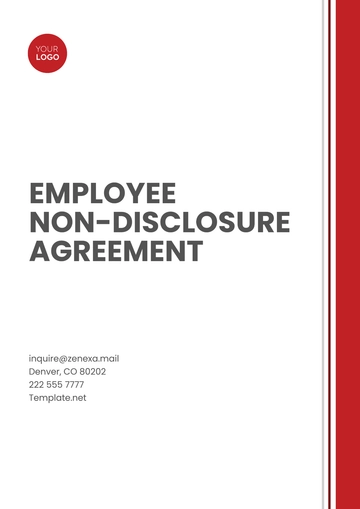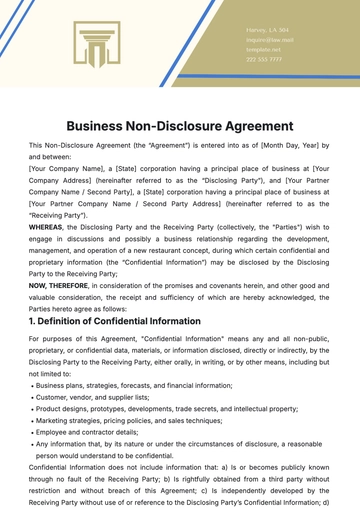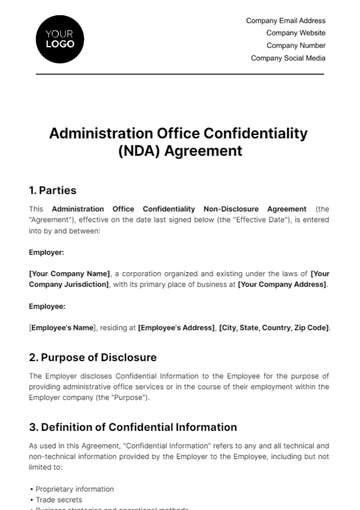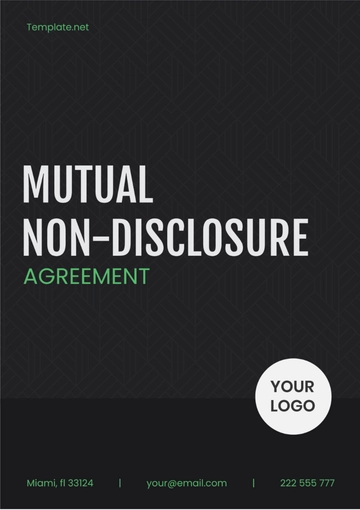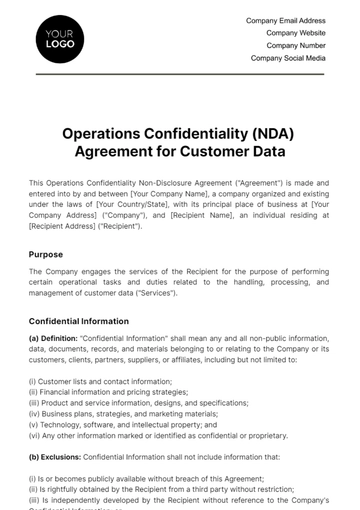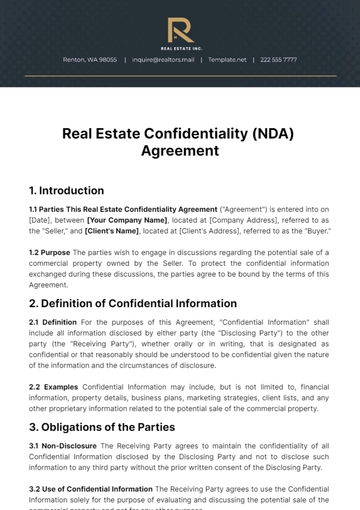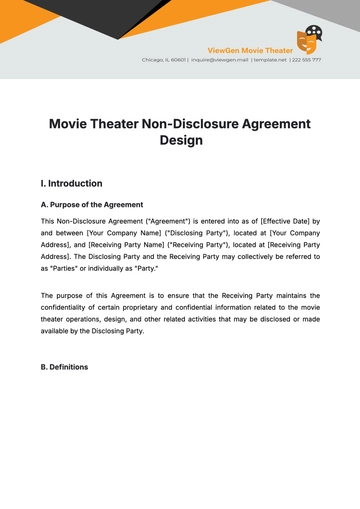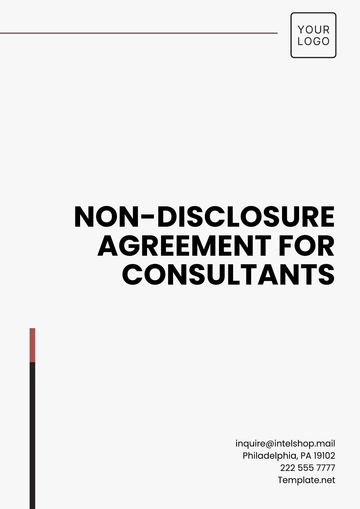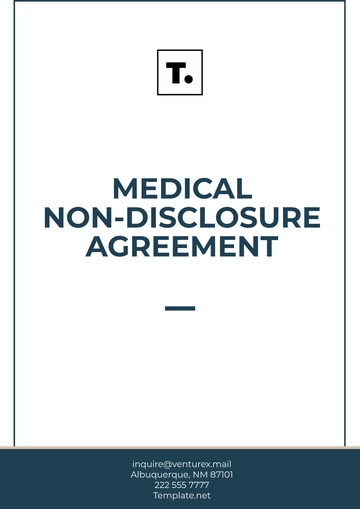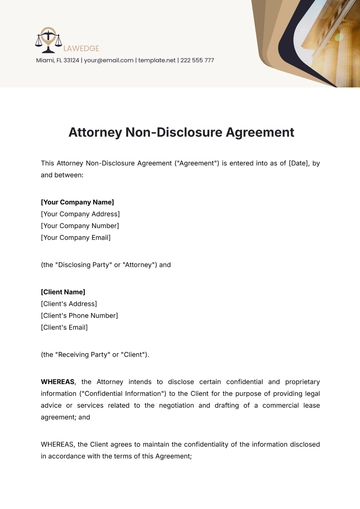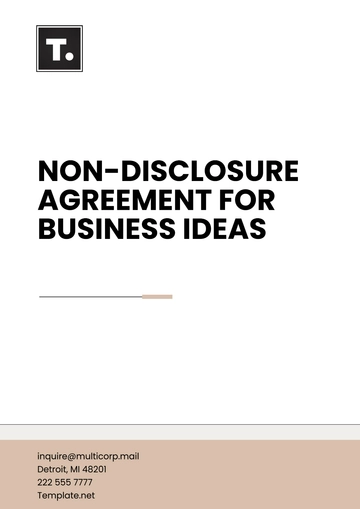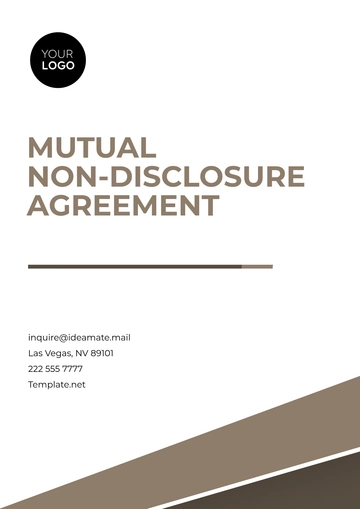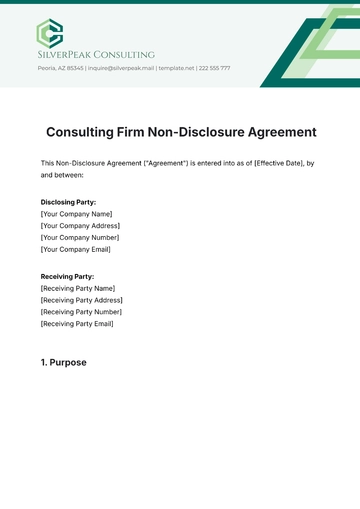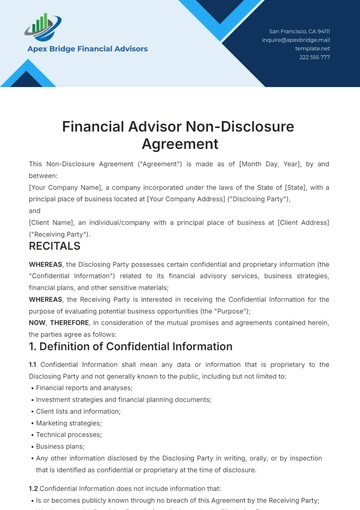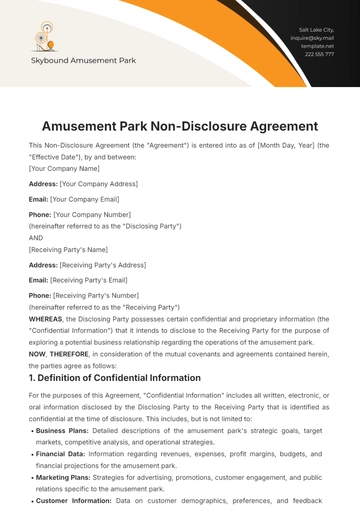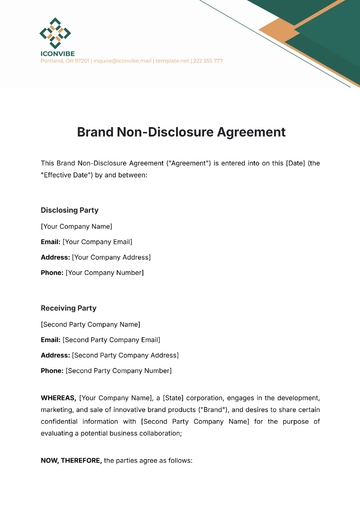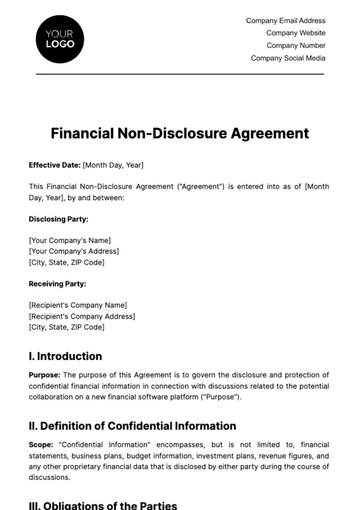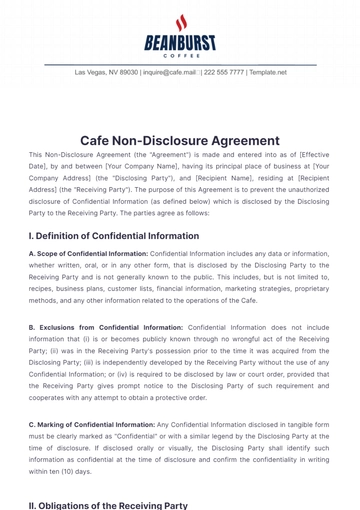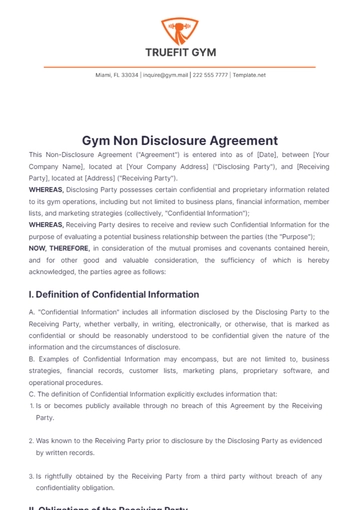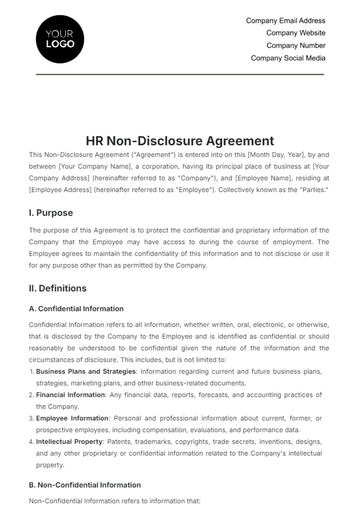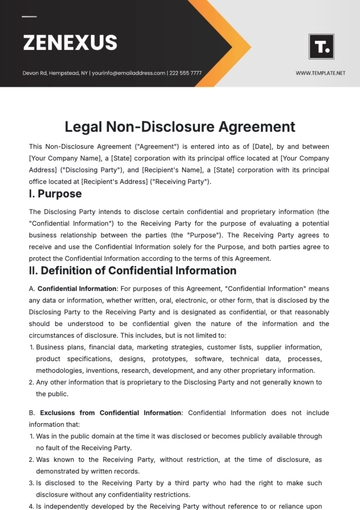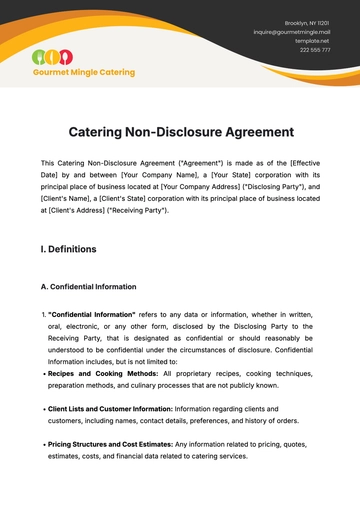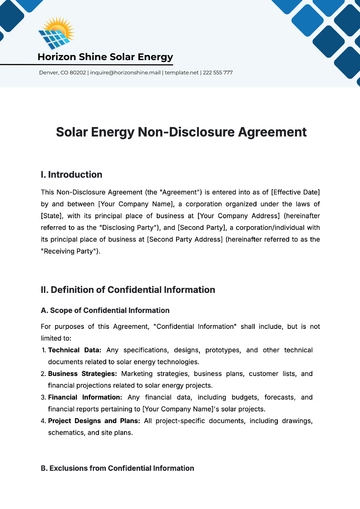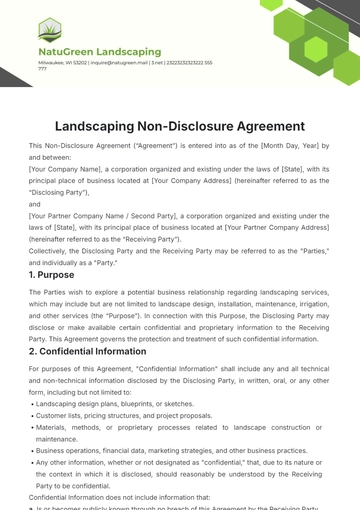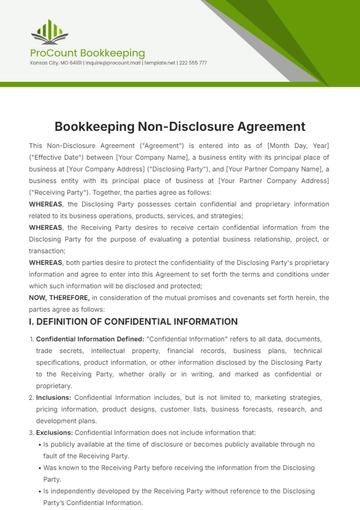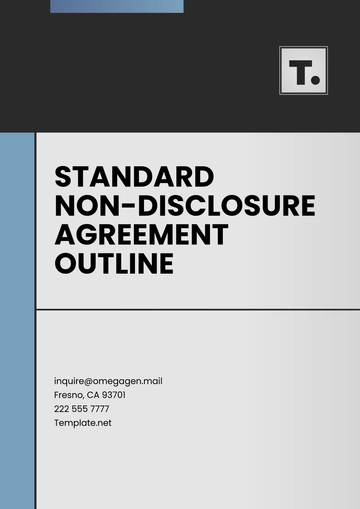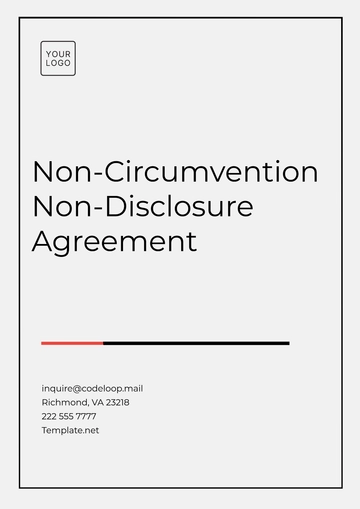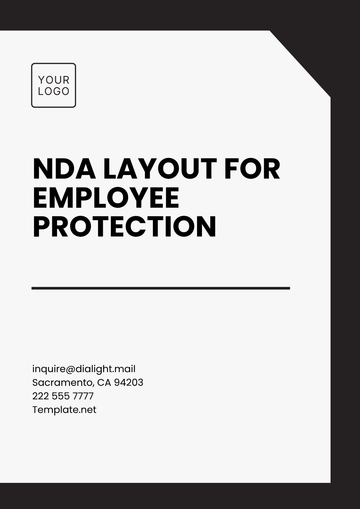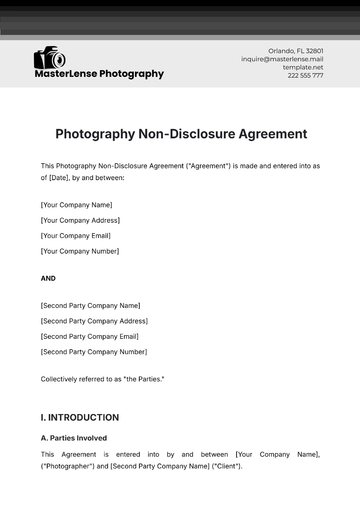Free Consulting Firm Non-Disclosure Agreement
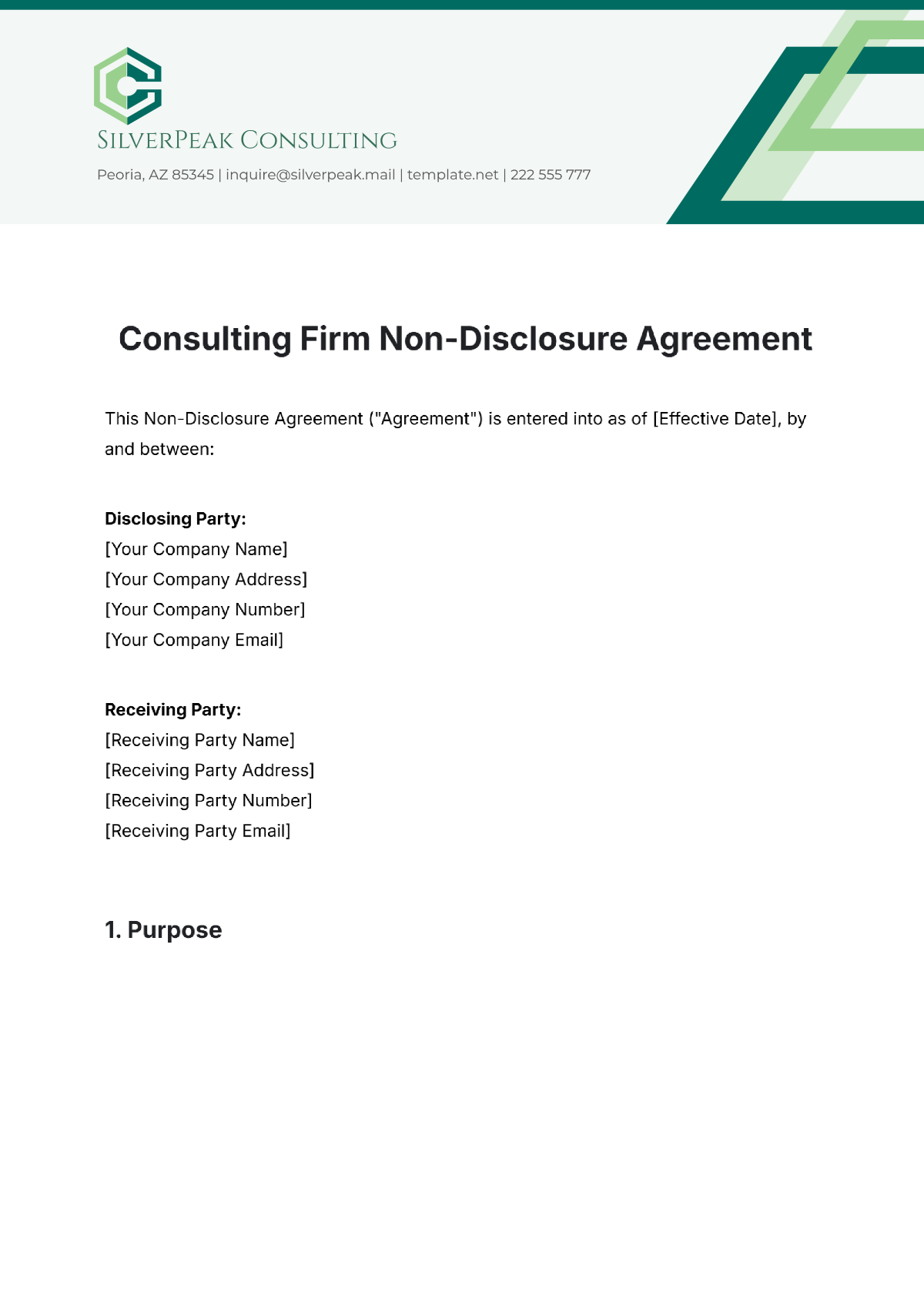
This Non-Disclosure Agreement ("Agreement") is entered into as of [Effective Date], by and between:
Disclosing Party:
[Your Company Name]
[Your Company Address]
[Your Company Number]
[Your Company Email]
Receiving Party:
[Receiving Party Name]
[Receiving Party Address]
[Receiving Party Number]
[Receiving Party Email]
1. Purpose
The purpose of this Agreement is to define the terms and conditions under which the Receiving Party is permitted to receive confidential or proprietary information from the Disclosing Party. This confidential information is being shared to facilitate discussions and possible future business arrangements, collaborations, or consulting engagements that may involve sensitive and valuable data. The parties acknowledge that the Confidential Information disclosed under this Agreement is essential to the business, operations, and success of the Disclosing Party, and as such, its protection is of paramount importance. The Receiving Party agrees to handle such information with the highest degree of care and responsibility.
2. Definitions
2.1 "Confidential Information"
For purposes of this Agreement, "Confidential Information" refers to any data, documents, designs, software, intellectual property, or other information that the Disclosing Party provides to the Receiving Party that is classified as confidential, proprietary, or restricted. Such information may include but is not limited to:
Business Information such as financial data, forecasts, business plans, marketing strategies, sales figures, customer and supplier data, contracts, pricing structures, and any related documents intended for internal use only. This may include information related to future strategic initiatives or product developments that are under discussion.
Technical Information including proprietary designs, trade secrets, product specifications, software code, engineering drawings, algorithms, processes, methods, and any technological or scientific information shared by the Disclosing Party. This could also involve information on current or future research and development efforts.
Intellectual Property such as patents, trademarks, service marks, copyrights, and any other intangible assets that represent the intellectual work and unique creations of the Disclosing Party, including any research or inventions that may result from the collaboration.
Documents and Records that include written, digital, or any form of recorded communication that is identified as confidential at the time of its disclosure, including non-disclosure agreements, notes, memoranda, emails, and physical documents.
2.2 "Disclosing Party"
The term "Disclosing Party" refers to [Your Company Name], the entity that discloses confidential or proprietary information to the Receiving Party. The Disclosing Party owns, controls, or otherwise holds the rights to the Confidential Information being shared, and as such, it has the responsibility and authority to impose confidentiality obligations on the Receiving Party.
2.3 "Receiving Party"
The term "Receiving Party" refers to the individual, entity, or organization that receives the Confidential Information from the Disclosing Party for evaluation, review, or use as part of potential or ongoing business dealings. The Receiving Party has the obligation to maintain the confidentiality of the information, ensuring that it is protected from unauthorized access, disclosure, or use.
3. Obligations of the Receiving Party
3.1 Confidentiality
The Receiving Party agrees to treat all Confidential Information disclosed under this Agreement as strictly confidential. The Receiving Party acknowledges that any breach of confidentiality could cause significant harm to the Disclosing Party, including loss of competitive advantage, financial losses, and harm to reputation. Therefore, the Receiving Party agrees to safeguard the information with at least the same level of care as they would use to protect their own confidential information, and in no event, less than reasonable care.
The Receiving Party will not reveal or discuss the Confidential Information with anyone outside the company or entity, unless specifically authorized by the Disclosing Party or required by law. The obligation of confidentiality will continue even after the termination of this Agreement, ensuring that the Confidential Information is protected for an appropriate period of time.
3.2 Use of Confidential Information
The Receiving Party agrees that the Confidential Information will only be used for the purpose of evaluating potential business relationships, partnerships, or opportunities as agreed upon by both parties. This includes activities directly related to consulting, business planning, technical evaluations, negotiations, or any other purpose mutually agreed upon by the parties. The Receiving Party agrees that they will not use the Confidential Information for any personal, commercial, or competitive advantage, and that the information will not be used to the detriment of the Disclosing Party’s interests.
The Receiving Party acknowledges that the Confidential Information is proprietary to the Disclosing Party and any unauthorized use or disclosure could lead to the loss of intellectual property rights, business opportunities, or financial damages.
3.3 Limitations on Disclosure
The Receiving Party shall not disclose the Confidential Information to any third party, whether directly or indirectly, without the prior written consent of the Disclosing Party. This applies to both individuals and organizations that are not directly involved in the project or agreement under consideration. The Receiving Party may only disclose Confidential Information to their employees, agents, consultants, or contractors on a need-to-know basis, provided that they are bound by confidentiality obligations equal to those in this Agreement.
In cases where disclosure is required by law, regulation, or court order, the Receiving Party shall promptly notify the Disclosing Party to allow them an opportunity to seek protective measures or contest the disclosure. The Receiving Party agrees to cooperate fully with the Disclosing Party in any efforts to maintain the confidentiality of the information.
3.4 Safeguards
The Receiving Party agrees to implement industry-standard safeguards to prevent unauthorized access, use, or disclosure of the Confidential Information. This includes the implementation of both physical and electronic security measures, such as encrypted communications, restricted access to databases, and password protection for digital documents. Furthermore, the Receiving Party will ensure that only individuals or entities with a legitimate need for access to the Confidential Information are allowed to review or handle it.
The Receiving Party shall also train their employees or agents involved in handling Confidential Information on the appropriate measures to ensure confidentiality is maintained. This training should include awareness of the risks associated with handling sensitive information, including the potential for data breaches or accidental disclosure.
4. Exclusions from Confidential Information
The confidentiality obligations outlined in this Agreement do not apply to information that:
Was in the public domain at the time of disclosure or becomes publicly available without any breach of this Agreement. This includes information that may have been disclosed by other sources, as long as they had the legal right to disclose it.
Is disclosed to the Receiving Party by a third party, provided that the third party is not under any confidentiality obligation to the Disclosing Party and the information is lawfully obtained.
Was independently developed by the Receiving Party without the use of or reference to the Confidential Information. This would include scenarios where the Receiving Party develops similar information, products, or solutions on their own, without using the Confidential Information as a foundation.
Is required to be disclosed by law, regulation, or court order. In this case, the Receiving Party must immediately notify the Disclosing Party in writing so that the Disclosing Party may take any necessary actions to protect their rights or request confidential treatment of the information.
5. Term of Agreement
5.1 Effective Date
This Agreement will become effective as of [Effective Date], which is the date on which both parties agree to its terms. It will remain in effect for the duration of any collaboration or engagement under which the Confidential Information is disclosed, and until the information no longer qualifies as confidential.
5.2 Duration of Confidentiality Obligation
The Receiving Party’s confidentiality obligations shall remain in effect for a period of [5] years from the date of disclosure of the Confidential Information, unless a longer period is agreed upon by both parties in writing. The obligation to maintain the confidentiality of intellectual property, including patents or trade secrets, shall continue indefinitely or until the information becomes publicly known.
6. Return or Destruction of Confidential Information
Upon the termination of this Agreement, or at any time upon written request from the Disclosing Party, the Receiving Party agrees to:
Immediately return all copies, records, and documents containing Confidential Information, including all digital files, physical documents, and any other materials that were created from or contain the Confidential Information.
Ensure that all digital data containing Confidential Information is deleted, erased, or destroyed, and that no copies of such data remain in the Receiving Party's possession, including data stored in backup systems or on remote servers.
The Receiving Party will provide the Disclosing Party with written confirmation of the destruction or return of all Confidential Information, including any digital files, no later than [30] days from the termination of the Agreement.
7. No License or Ownership Rights
7.1 Non-Transferable Rights
By disclosing Confidential Information under this Agreement, the Disclosing Party does not transfer any rights, titles, or interests to the Receiving Party. The Receiving Party acknowledges that the Confidential Information is proprietary and owned exclusively by the Disclosing Party. The Receiving Party shall have no right to use, sell, license, or exploit the Confidential Information for any purpose outside of the scope of this Agreement.
7.2 No License
This Agreement does not grant the Receiving Party any intellectual property rights or licenses, express or implied, under any patents, trademarks, copyrights, or trade secrets of the Disclosing Party. The Confidential Information may contain valuable intellectual property that remains the exclusive property of the Disclosing Party.
8. No Obligation to Proceed with Business
Neither party is under any obligation to proceed with any business transaction, project, or relationship as a result of the execution of this Agreement. The exchange of Confidential Information does not compel either party to enter into any future contracts, and either party may terminate negotiations at any time without penalty. This Agreement solely governs the protection of Confidential Information during the course of discussions or evaluations.
9. Remedies
9.1 Injunctive Relief
The Receiving Party acknowledges that a breach of this Agreement could result in immediate and irreparable harm to the Disclosing Party, and that monetary damages alone may not be sufficient to remedy the breach. Therefore, the Disclosing Party will be entitled to seek injunctive relief in the event of any violation or threat of violation of the confidentiality provisions of this Agreement.
9.2 Monetary Damages
In addition to injunctive relief, the Disclosing Party may seek monetary damages for any actual losses incurred as a result of the breach. These damages could include loss of business opportunities, lost profits, or any other costs directly attributable to the Receiving Party's breach of confidentiality.
10. General Provisions
10.1 Governing Law
This Agreement shall be governed by and construed in accordance with the laws of [Your Jurisdiction], without regard to its conflicts of laws principles. Any disputes arising under this Agreement shall be resolved in the appropriate courts of [Your Jurisdiction].
10.2 Entire Agreement
This Agreement constitutes the entire understanding between the parties with respect to the subject matter hereof and supersedes any previous oral or written agreements or representations. No modification or amendment of this Agreement will be valid unless made in writing and signed by both parties.
10.3 Amendments
Any amendments or changes to this Agreement must be made in writing and executed by authorized representatives of both parties. Such amendments will be deemed effective as of the date specified in the amendment, or as otherwise agreed.
10.4 Severability
If any provision of this Agreement is found to be invalid, illegal, or unenforceable, the remainder of the Agreement will remain in full force and effect. The invalid or unenforceable provision will be replaced with a valid provision that most closely reflects the intent of the original provision.
10.5 Assignment
Neither party may assign or transfer this Agreement or any rights or obligations hereunder without the prior written consent of the other party, except in the case of a merger, acquisition, or sale of assets.
Signature
Disclosing Party:
[Your Company Name]
 Printed Name:
Printed Name:
Title:
Date:
Receiving Party:
[Receiving Party Name] Printed Name:
Printed Name:
Title:
Date:
- 100% Customizable, free editor
- Access 1 Million+ Templates, photo’s & graphics
- Download or share as a template
- Click and replace photos, graphics, text, backgrounds
- Resize, crop, AI write & more
- Access advanced editor
Protect sensitive information with the Consulting Firm Non-Disclosure Agreement Template from Template.net. This editable and customizable template ensures confidentiality between you and your clients. Customize it using our Ai Editor Tool to safeguard intellectual property and confidential details.
You may also like
- Lease Agreement
- Non Compete Agreement
- Rental Agreement
- Prenuptial Agreement
- Non Disclosure Agreement
- Operating Agreement
- Hold Harmless Agreement
- LLC Operating Agreement
- Arbitration Agreement
- Purchase Agreement
- Residential Lease Agreement
- Executive Agreement
- Confidentiality Agreement
- Contractor Agreement
- Partnership Agreement
- Postnuptial Agreement
- Collective Bargaining Agreement
- Loan Agreement
- Roommate Agreement
- Commercial Lease Agreement
- Separation Agreement
- Cohabitation Agreement
- Room Rental Agreement
- Child Custody Agreement
- Employee Agreement
- License Agreements
- Settlement Agreement
- Joint Venture Agreement
- Indemnity Agreement
- Subordination Agreement
- Sales Agreement
- Agreements Between Two Parties
- Business Agreement
- Real Estate Agreement
- HR Agreement
- Service Agreement
- Property Agreement
- Agreement Letter
- Restaurant Agreement
- Construction Agreement
- Finance Agreement
- Marketing Agreement
- Payment Agreement
- Investment Agreement
- Management Agreement
- Nonprofit Agreement
- Software Agreement
- Startup Agreement
- Agency Agreement
- Copyright Agreement
- Collaboration Agreement
- Reseller Agreement
- Car Rental Agreement
- Cleaning Services Agreement
- Consultant Agreement
- Deed Agreement
- Car Agreement
- Equipment Agreement
- Shares Agreement
- Data Sharing Agreement
- Advertising Agreement
- School Agreement
- Franchise Agreement
- Event Agreement
- Travel Agency Agreement
- Vehicle Agreement
- Board Resolution Agreement
- Land Agreement
- Binding Agreement
- Tenancy Agreement
- Exclusive Agreement
- Development Agreement
- Assignment Agreement
- Design Agreement
- Equity Agreement
- Mortgage Agreement
- Purchase and Sale Agreement
- Shareholder Agreement
- Vendor Agreement
- Royalty Agreement
- Vehicle Lease Agreement
- Hotel Agreement
- Tenant Agreement
- Artist Agreement
- Commission Agreement
- Consignment Agreement
- Debt Agreement
- Recruitment Agreement
- Training Agreement
- Transfer Agreement
- Apprenticeship Agreement
- IT and Software Agreement
- Referral Agreement
- Resolution Agreement
- Waiver Agreement
- Consent Agreement
- Partner Agreement
- Social Media Agreement
- Customer Agreement
- Credit Agreement
- Supply Agreement
- Agent Agreement
- Brand Agreement
- Law Firm Agreement
- Maintenance Agreement
- Mutual Agreement
- Retail Agreement
- Deposit Agreement
- Land Purchase Agreement
- Nursing Home Agreement
- Supplier Agreement
- Buy Sell Agreement
- Child Support Agreement
- Landlord Agreement
- Payment Plan Agreement
- Release Agreement
- Research Agreement
- Sponsorship Agreement
- Buyout Agreement
- Equipment Rental Agreement
- Farm Agreement
- Manufacturing Agreement
- Strategic Agreement
- Termination of Lease Agreement
- Compliance Agreement
- Family Agreement
- Interior Design Agreement
- Ownership Agreement
- Residential Lease Agreement
- Retainer Agreement
- Trade Agreement
- University Agreement
- Broker Agreement
- Dissolution Agreement
- Funding Agreement
- Hosting Agreement
- Investor Agreement
- Memorandum of Agreement
- Advisory Agreement
- Affiliate Agreement
- Freelancer Agreement
- Grant Agreement
- Master Service Agreement
- Parking Agreement
- Subscription Agreement
- Trust Agreement
- Cancellation Agreement
- Horse Agreement
- Influencer Agreement
- Membership Agreement
- Vacation Rental Agreement
- Wholesale Agreement
- Author Agreement
- Distributor Agreement
- Exchange Agreement
- Food Agreement
- Guarantee Agreement
- Installment Agreement
- Internship Agreement
- Music Agreement
- Severance Agreement
- Software Development Agreement
- Storage Agreement
- Facility Agreement
- Intercompany Agreement
- Lending Agreement
- Lodger Agreement
- Outsourcing Services Agreement
- Usage Agreement
- Assurance Agreement
- Photography Agreement
- Profit Sharing Agreement
- Relationship Agreement
- Rent To Own Agreement
- Repayment Agreement
- Volunteer Agreement
- Co Parenting Agreement
- HVAC Agreement
- Lawn Care Agreement
- SAAS Agreement
- Work from Home Agreement
- Coaching Agreement
- Protection Agreement
- Security Agreement
- Repair Agreement
- Agreements License

